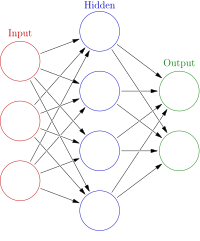
Photo from wikipedia
We propose a new methodology to evaluate future electricity generation scenarios aiming to explore implications of different sets of power plants on the water‐energy nexus (W‐EN). We use two artificial… Click to show full abstract
We propose a new methodology to evaluate future electricity generation scenarios aiming to explore implications of different sets of power plants on the water‐energy nexus (W‐EN). We use two artificial neural networks: cascade forward back propagation and Kohonen neural networks (KNN). Initially, the future electricity production of the area under investigation is determined. Sequentially, water consumption is calculated for different combinations of plants. The scenarios with the lowest annual water consumption values are based only on wind and photovoltaic (PV) plants. Despite using only renewable energy, the inclusion of concentrating solar power in a future scenario brings a significant increase in water consumption, challenging the sustainability of this matrix. A conservative scenario (50% of electricity production by thermal power plants and 50% by renewable energy) shows the highest annual water consumption, also a barrier to sustainability.
Journal Title: International Journal of Energy Research
Year Published: 2021
Link to full text (if available)
Share on Social Media: Sign Up to like & get
recommendations!